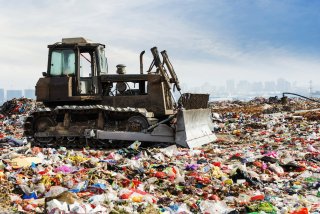Environmental Benefits of Anaerobic Digestion (AD)
On this page:
- Diversion of Organics from Landfills
- Renewable Energy Generation
- Soil Health Benefits
- Methane Emissions Reduction
- Manure Management
Diversion of Organics from Landfills
Organic materials can be separated from the municipal solid waste (MSW) stream and processed in an anaerobic digester. These materials include:
- Food scraps from residential properties;

- Food scraps from businesses (e.g., restaurants);
- Commercial food processing waste;
- Fats, oils and greases; and
- Yard waste.
Keeping organic materials out of landfills is beneficial for the environment. If these materials are allowed to decay in landfills, methane can be released into the air and contribute to climate change.
The loss of valuable nutrients from our ecosystem is another downside to landfilling organic materials. When these materials are anaerobically digested, the resulting nutrients found in digestate can be used to feed and nourish the soil.
Learn more about the soil health benefits found in digestate.
Renewable Energy Generation
When organic materials are anaerobically digested, biogas is created. Biogas is a renewable source of energy.
Learn more about renewable energy.
Biogas can be used to power engines and generators to produce mechanical power, heat and/or electricity or a combination of these uses. It can also be compressed for vehicle fuel and after treatment can be used in similar applications as natural gas.
Learn more about how biogas is used.
Soil Health Benefits

It is important to maintain soils that are healthy and productive to grow food to feed our local, national and world populations.
Anaerobic digestion produces digestate, a nutrient-rich slurry. Digestate can be applied to agricultural land as a fertilizer and/or soil amendment to improve soil health. Digestate that is applied to land is subject to both state and federal regulations.
Technology exists to separate the digestate into solid and liquid components, which may be managed individually for reuse or further treatment. For example, the solid component may be heat-dried to produce fertilizer pellets or composted prior to land application.
The practice of land application of digestate can improve the health of our soils. Soil benefits can include:
- Increasing organic matter content;
- Reducing the need to apply chemical fertilizers and pesticides;
- Improving plant growth;
- Reducing soil erosion and nutrient runoff;
- Alleviating soil compaction; and
- Helping increase the soil’s water retention ability, which reduces the need for irrigation.
To ensure that land application is properly done, a nutrient and soil management plan is required in most states.
Methane Emissions Reduction
Methane is created when organic materials decompose in oxygen-free environments like landfills and manure lagoons. Anaerobic digestion systems capture methane and allow us to use that methane in a beneficial way.
Capturing methane is important because methane is a potent greenhouse gas that contributes to climate change if allowed to escape to the atmosphere. Promoting the use of technologies like anaerobic digestion will help meet the methane emissions goals set by the Biden Administration (2030 Greenhouse Gas Pollution Reduction Targets).
Learn more in this fact sheet from EPA and USDA:
- Food Waste and Methane: What’s the Connection? (pdf)(2.1 MB).
- Desperdicio de alimentos y metano: ¿cuál es la relación? (pdf)(1.3 MB).
Manure Management
Anaerobic digesters are used on livestock farms as part of an integrated manure management approach providing farmers with additional options. These systems allow farmers a way to:
- Reduce methane emissions from manure lagoons, stockpiles and storage ponds;
- Minimize odors and pathogens;
- Generate products for use on the farm, such as animal bedding and high quality fertilizer; and
- Reduce solids content.
In order to increase biogas production, livestock manure may also be combined or "co-digested" into anaerobic digesters along with other organic materials.
